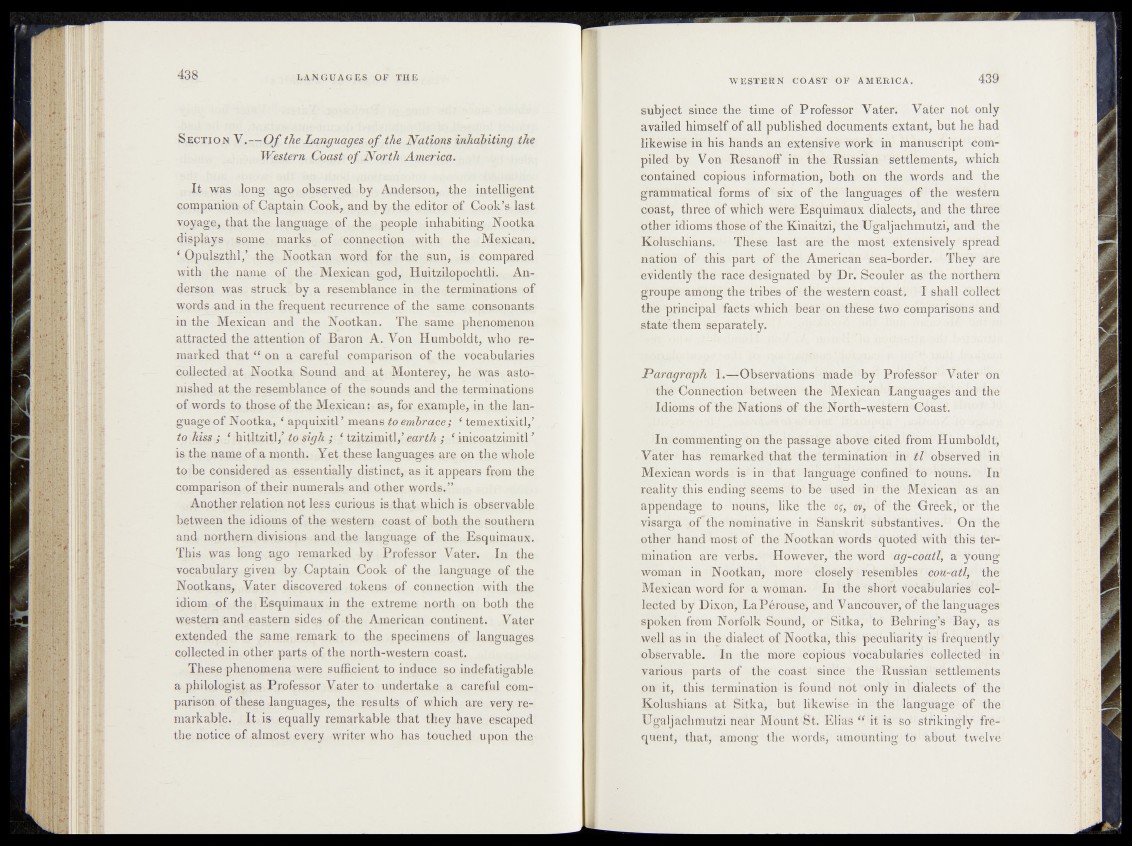
S e c t io n V .—O f the Languages o f the Nations inhabiting the
Western Coast of,JYorth America.
It was <jong. Ego observed by Anderson, the-intelligent
companion of Captain C.oolc, End by the editor of Cook’s last
voyage, that the langut^e^of the people inhabiting j^potka
displays ; some.i marina of connection with the Mexican.
‘ Opulszthl,’' the Nootkan word for the sun, is compared
with the name of. the Mexican god, Hqitzilopoehtli,. Anderson
was struck, by a resemblance in the-terminations of
words andjin tjre %fajuent recurrejnce p f the sapiei pqnsoiiants
in the Mexican and the Sfootkan. Thfj-i^io^phenmfienipn
attracted the attention of Baron A. Yon Humboldt, who remarked
that “ on a careful comparison of the vocabularies
collected at Jfootka Sonnd and at .he.^was'^a«^
wished at. the resemblance of the sounds and tlm termil^tttlis
of words to those of the Mexican: ag, for example, in the language
of Nootka, * apquixitl ’ means to embrace; * tem.extix.itl,’
tq kiss ; 1 hitltzitl,’ to sigh ; * tzitzimitl/eart^
is the name of a month. Yet these languages ace on the whole
to be considered as essentially distinct, as it appears fom the
comparison p f their numerals and other w§rd§k’W
Another relation not less curious is .that which i§ observable
between the idjome of the western coast pf both the, southern
and northern divisions and the language of the Esquimaux.
This was long ago remarked by Professor Vater. In the
vocabulary givgn by* Captain Cook of the language of the
Nootkans, Vater, discovered tokens of connection with the
idiom of thfi i Esquimaux in the extreme north on both the
western iamV,casern sides p f the American continent. Vater
extended the eamOiitOituark to the specimens of languages
collected in other parts of the north-western coast.
These phenomena were sufficient to inff.uce so indefatigable
a philologisf as Professor Vater to undertake a careful comparison
of these languages, the results, of which are very remarkable.
It is equally remarkable that they have escaped
the notice of almost every writer who has touched upon the
subject since the time of Professor Vater. Vater not only
availed himself of all published documents extant, but he had
likewise in his hands an extensive work in manuscript compiled
by Von Resanoff in the! Russian settlements, which
contained copious information, both on the words and the
grammatical forms ‘'off six of1 the languages of the western
coast, three Of which were- Esquimaux dialects, and the three
other- idioms thosCPftbe Kinaitziy the lfgaljachmutzi, and the
Koluschians. These last are the most extensively spread
nation of this part of the American \seR4sorder. They are
evidently the race designated by Dk Seouler as the northern
groupe among the tribes of -the western coast;- I shall collect
the® principal faets which bear on these two comparisons and
state them separately.
Paragraph ’ :L-«*Observatioiis made by Priofeèsdr^ Vatbr ' On
' »the f>ontiectibn between 'thë^Mëjdëhff LanglSdges'Mnd' thé1
Idioms of the Nations of thé North-wesfern 0óastl -
In commenting On the pasSRgé1 aho%ferfcffed frona Hiimbbldt,
Vatër has remarked that the termination ïrt- éZr obëèrved in
Me!xican_words^ is in : thhl1 In
reality this ending Seems to be ^usêd ’ïn the MeXié'an a s; art
a^endagé to moons,like the uó^, év>! èf Jtte ïra ë êk l-b ï5 êhè
vissr^a .of the nominative in Banekrit 1sffbsta!ntivieil' OO-tho
other hand most of the Mootkan wörds 'quoted with this termination
are ;vérbs. HÖ#ef#,’ thÖJt ^ d a yohhg
woman in Nootkan, moré
Mexican word for a woman. ' In ^ h é vshöTt ¥OêkbuI#ié^%ol-
lected by Dixon-, LaPérousej and Varicoütëtyof thë tahgiiftgèS^
spoken from Norfolk S'ótond, oC^Sitka'/^tö Bëht®ög^: Bay, as
well as in the diftfeot #-¥rétl^ënt;ly
observable. In thè möre cOpibnSJ-bóca'bé'lari'ès! ëdlleëtM-' in
various parts of th n 'c ib ^ ^ineë' the 'Russian l^btlëÉhènts
on-it, this termination iSf foünd ! ndt Pnly: ih dialOOtb OMhe
Kolushians at Sitka, but likewise in thëXilaögifa'g^of thë
Ugaljaclimutzi near Mount St-. EliaS *®C it^SK;sdP*stfrkindly frequent,
that, among the words, amounting to about twelve